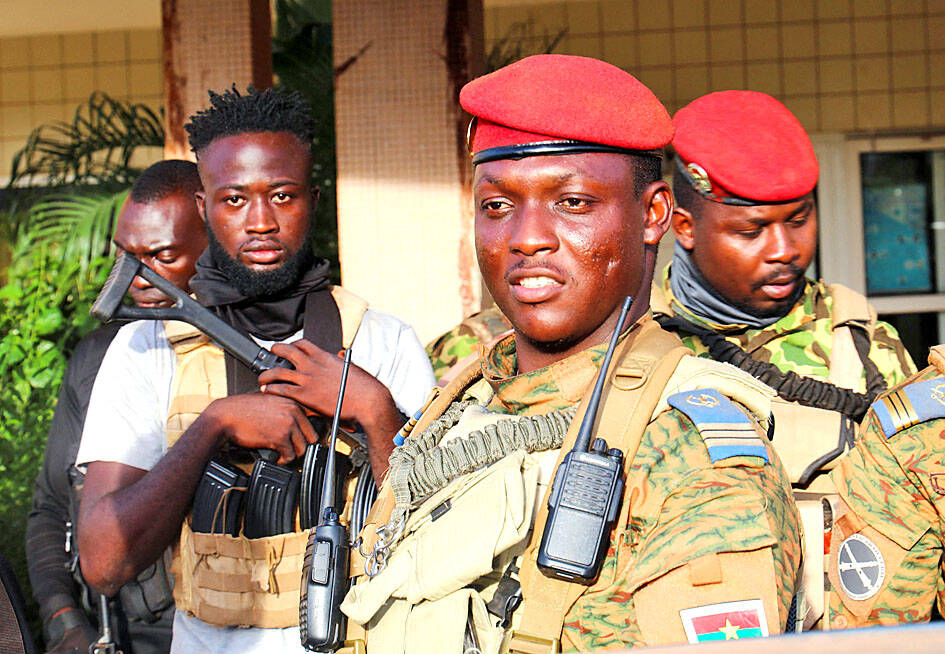Burkina Faso’s junta leader on Sunday agreed to step down, religious and community leaders said, two days after army officers announced his ouster in a coup that sparked internal unrest and international condemnation.
Lieutenant-Colonel Paul-Henri Sandaogo Damiba “himself offered his resignation in order to avoid confrontations with serious human and material consequences,” the leaders said in a statement.
It followed mediation between Damiba and the new self-proclaimed leader, Captain Ibrahim Traore, by the religious and community leaders, they added.

Photo: Reuters
Regional diplomatic sources said Damiba — who himself took power in a January putsch — had fled to Togo’s capital, Lome, on Sunday, following the unstable and impoverished West African nation’s second coup this year.
Traore announced in the evening that he had received the support of army chiefs to “reinvigorate” the country’s struggle against militants.
In a statement on Sunday, the Economic Community of West African States (ECOWAS) welcomed that the various players in the Burkinabe drama had accepted “a peaceful settlement of their differences.”
An ECOWAS delegation was yesterday to travel to Ouagadougou, the statement added.
Damiba set “seven conditions” for stepping down, the leaders said.
These included security guarantees for him and his allies in the military; and that the pledge he had given to West Africa’s regional bloc for a return to civilian rule within two years be respected.
The religious and community leaders — who are very influential in Burkina Faso — said that Traore, 34, had accepted the conditions and called for calm.
The putschists lifted an overnight curfew imposed on Friday and reopened the country’s borders.
Damiba had said on Saturday that he had no intention of giving up power, urging the officers to “come to their senses” amid a backdrop of protests.
However, a statement issued on Sunday by the pro-Traore military said he would remain in charge “until the swearing-in of the president of Burkina Faso designated by the nation’s active forces,” at an unspecified date.
The officers had accused Damiba of having taken refuge at a military base of former colonial power France to plot a “counter-offensive,” charges he and France denied.
Damiba came to power in the nation of 16 million people in a January coup, accusing then-Burkinabe president Roch Marc Christian Kabore of failing to beat back militant fighters.
Yet the insurgency has raged on and more than 40 percent of Burkina Faso remains outside government control.
Thousands have died and about 1 million have been displaced by the fighting since 2015, when the insurgency spread to Burkina Faso from neighboring Mali.
The officers said it was Damiba’s failure to quell the militant attacks that had prompted them to act.
The new self-proclaimed Burkina leaders had said they were willing “to go to other partners ready to help in the fight against terrorism.”
No country was explicitly mentioned but Russia is among the possible partners in question.

POLITICAL PRISONERS VS DEPORTEES: Venezuela’s prosecutor’s office slammed the call by El Salvador’s leader, accusing him of crimes against humanity Salvadoran President Nayib Bukele on Sunday proposed carrying out a prisoner swap with Venezuela, suggesting he would exchange Venezuelan deportees from the US his government has kept imprisoned for what he called “political prisoners” in Venezuela. In a post on X, directed at Venezuelan President Nicolas Maduro, Bukele listed off a number of family members of high-level opposition figures in Venezuela, journalists and activists detained during the South American government’s electoral crackdown last year. “The only reason they are imprisoned is for having opposed you and your electoral fraud,” he wrote to Maduro. “However, I want to propose a humanitarian agreement that

ECONOMIC WORRIES: The ruling PAP faces voters amid concerns that the city-state faces the possibility of a recession and job losses amid Washington’s tariffs Singapore yesterday finalized contestants for its general election on Saturday next week, with the ruling People’s Action Party (PAP) fielding 32 new candidates in the biggest refresh of the party that has ruled the city-state since independence in 1965. The move follows a pledge by Singaporean Prime Minister Lawrence Wong (黃循財), who took office last year and assumed the PAP leadership, to “bring in new blood, new ideas and new energy” to steer the country of 6 million people. His latest shake-up beats that of predecessors Lee Hsien Loong (李顯龍) and Goh Chok Tong (吳作棟), who replaced 24 and 11 politicians respectively

Young women standing idly around a park in Tokyo’s west suggest that a giant statue of Godzilla is not the only attraction for a record number of foreign tourists. Their faces lit by the cold glow of their phones, the women lining Okubo Park are evidence that sex tourism has developed as a dark flipside to the bustling Kabukicho nightlife district. Increasing numbers of foreign men are flocking to the area after seeing videos on social media. One of the women said that the area near Kabukicho, where Godzilla rumbles and belches smoke atop a cinema, has become a “real

‘POINT OF NO RETURN’: The Caribbean nation needs increased international funding and support for a multinational force to help police tackle expanding gang violence The top UN official in Haiti on Monday sounded an alarm to the UN Security Council that escalating gang violence is liable to lead the Caribbean nation to “a point of no return.” Special Representative of the UN Secretary-General for Haiti Maria Isabel Salvador said that “Haiti could face total chaos” without increased funding and support for the operation of the Kenya-led multinational force helping Haiti’s police to tackle the gangs’ expanding violence into areas beyond the capital, Port-Au-Prince. Most recently, gangs seized the city of Mirebalais in central Haiti, and during the attack more than 500 prisoners were freed, she said.